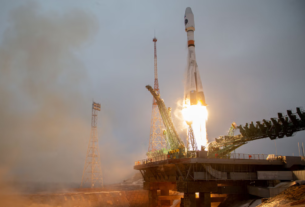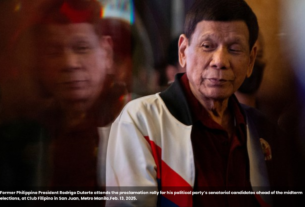North Korea has announced plans to further strengthen its nuclear arsenal, according to state media KCNA. The declaration comes as tensions with the United States and South Korea continue to escalate.
“You cannot expect us to remain defenseless,” a North Korean official stated. The government insists that its nuclear weapons program is essential for national security and deterrence.
Leader Kim Jong Un has ordered military scientists to accelerate weapons development. Officials claim that enhancing nuclear capabilities will help deter potential threats from foreign adversaries.
The announcement follows recent joint military drills conducted by the U.S. and South Korea. North Korea views these exercises as preparation for an invasion and has vowed to respond with greater military strength.
“The enemy is constantly provoking war,” KCNA reported. The government has accused Washington and Seoul of heightening regional instability through their military activities.
Satellite images suggest that North Korea is expanding its missile production facilities. Analysts believe that the country is developing more advanced warheads and long-range missile capabilities.
In recent months, North Korea has conducted multiple missile tests, including the launch of intercontinental ballistic missiles (ICBMs). These tests demonstrate Pyongyang’s ability to strike targets far beyond the Korean Peninsula.
U.S. officials warn that North Korea’s missile technology has advanced to the point where it could potentially reach American territory. Military leaders emphasize the need for strong deterrence to counter the growing threat.
The Trump administration has called on North Korea to return to nuclear negotiations. However, diplomatic efforts have stalled since talks collapsed in 2019.
“You cannot negotiate with an untrustworthy opponent,” a North Korean spokesperson said. The government refuses to abandon its nuclear program, citing concerns over national security.
Despite years of international sanctions, North Korea has continued to expand its weapons program. The country has found ways to bypass restrictions through illegal trade and clandestine financial networks.
China and Russia have opposed additional U.N. sanctions on North Korea, arguing that diplomatic engagement is a better approach. Both countries maintain economic and political ties with Pyongyang.
In response to North Korea’s growing military capabilities, South Korea has strengthened its missile defenses. President Yoon Suk Yeol has pledged to enhance national security and reinforce defense cooperation with allies.
“You cannot allow threats to go unanswered,” a South Korean military official said. The country has increased military coordination with the U.S. and Japan to counter potential aggression.
The Trump administration has reaffirmed its commitment to defending its allies. U.S. officials have warned that any North Korean attack would have severe consequences.
Pyongyang has dismissed these warnings as “empty threats.” The government claims that it is fully prepared for any conflict that may arise.
The international community remains divided on how to handle North Korea’s nuclear ambitions. Some leaders advocate for diplomacy, while others push for stronger military measures.
Japan has expressed concerns over North Korea’s missile activity and has upgraded its defense systems in preparation for possible attacks.
“You need to take North Korea’s actions seriously,” a Japanese defense analyst stated. Officials worry that further provocations could lead to regional instability.
The United Nations has condemned North Korea’s continued nuclear expansion. However, Pyongyang has ignored calls for disarmament and insists that its military program will continue.
North Korea’s economy has suffered due to sanctions and international isolation. Despite food shortages and economic hardships, the government remains focused on expanding its nuclear arsenal.
Experts warn that North Korea’s aggressive military stance could destabilize the region. Without negotiations, tensions are expected to escalate further.
The U.S. and its allies are closely monitoring the situation. Military preparations in the region have intensified in response to Pyongyang’s threats.
North Korea has shown no signs of backing down. Its commitment to nuclear expansion remains unchanged, raising the risk of further confrontation.
The situation remains unpredictable, and the possibility of conflict continues to grow.




